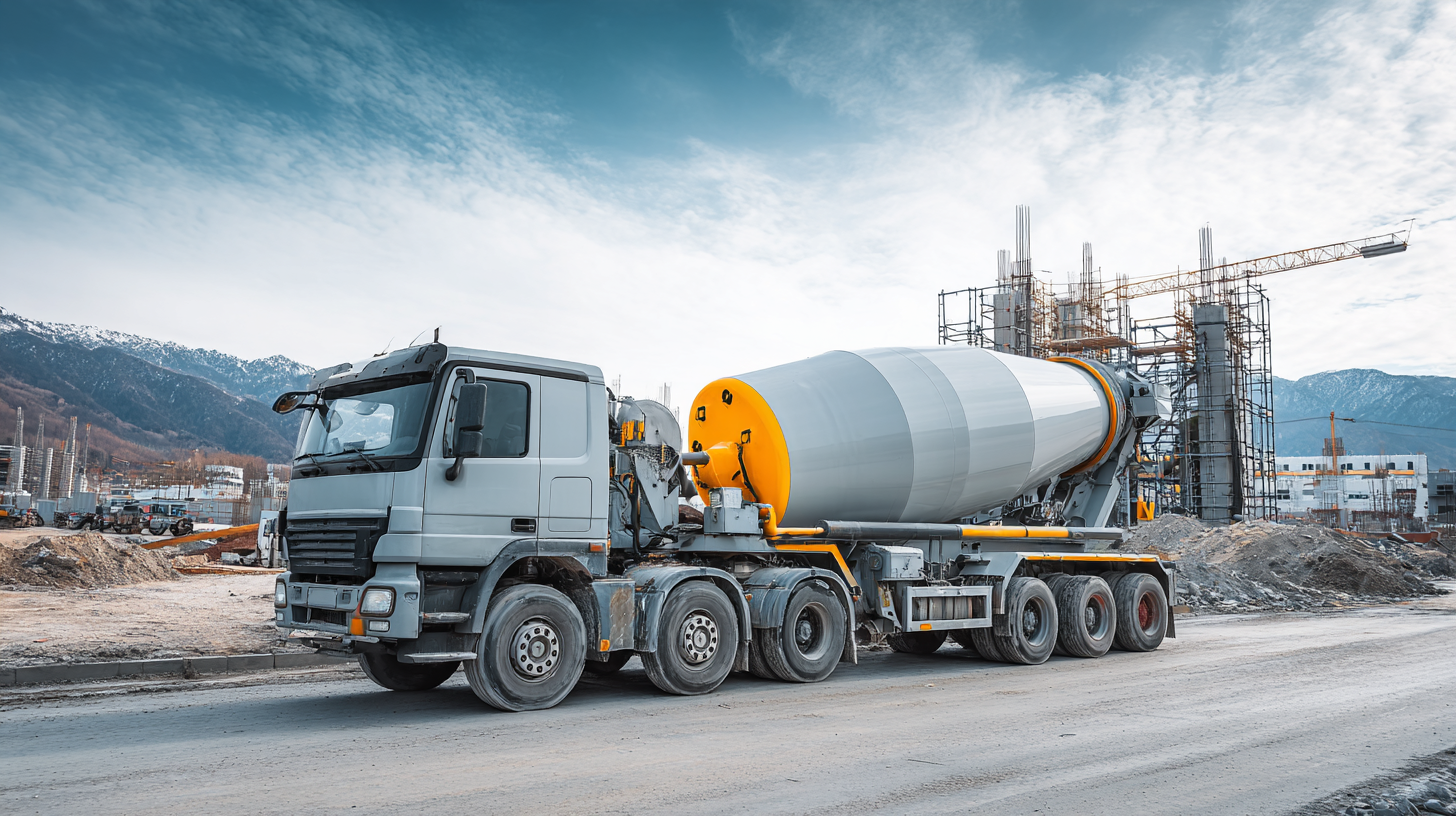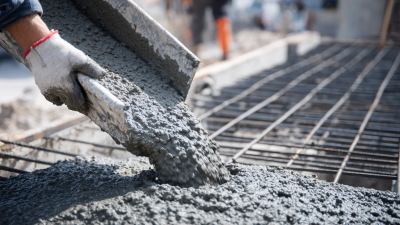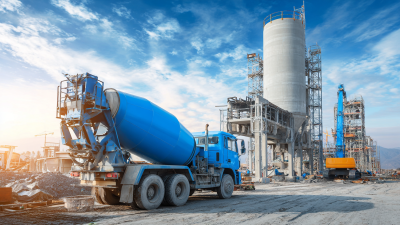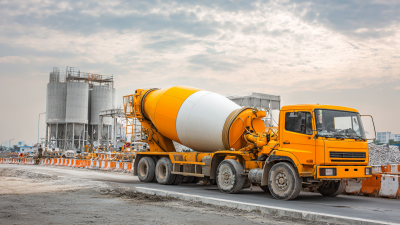In the rapidly evolving landscape of construction, the efficiency of ready mix cement delivery has emerged as a critical component for timely project completion. As construction demands increase in 2025, streamlining the delivery process is more vital than ever. Renowned industry expert, John Smith, a senior operations manager at Concrete Solutions Inc., highlights the importance of this aspect, stating, "An optimized ready mix cement delivery process not only enhances productivity but also significantly reduces overhead costs."

With projects becoming more complex and timelines tighter, construction managers are increasingly turning their attention to improving logistics in ready mix cement delivery. By adopting innovative technologies and refining coordination between suppliers and contractors, businesses can mitigate delays and ensure consistent quality. This approach not only safeguards project budgets but also contributes to a more sustainable construction environment.
As we delve into the strategies for optimizing ready mix cement delivery, it becomes evident that a proactive stance is essential. From leveraging real-time tracking systems to prioritizing reliable communication channels, these measures represent a pathway toward operational excellence in the construction industry, paving the way for success in 2025 and beyond.
Effective order scheduling is crucial for optimizing ready mix cement delivery in construction projects. A well-planned delivery schedule not only reduces downtime on-site but also enhances productivity. By using real-time data analytics and forecasting tools, project managers can better predict material needs based on previous usage patterns, seasonal demands, and project timelines. This enables them to communicate specific delivery windows to suppliers, ensuring that the right amount of cement arrives exactly when it’s needed.
Collaboration with suppliers is essential to streamline the delivery process. Establishing a clear line of communication can help address any potential delays or adjustments needed in the schedule. Implementing a just-in-time delivery strategy allows for a more agile response to changes in project scope or unforeseen circumstances. By prioritizing coordination between construction teams and cement suppliers, companies can minimize waste, reduce costs, and maintain project momentum, ultimately leading to a more efficient workflow on-site.
In the fast-paced construction industry, the efficiency of ready mix cement delivery is paramount. Utilizing technology for real-time tracking of deliveries can significantly enhance project timelines and resource management. According to a report by the National Concrete Masonry Association, incorporating such technologies can reduce delivery times by up to 30%, ensuring that materials arrive precisely when needed. This optimization not only minimizes downtime on the construction site but also decreases costs associated with idle machinery and labor.
To implement real-time tracking effectively, construction businesses can adopt GPS-enabled delivery trucks and mobile apps designed for logistics management. These tools provide instant updates on delivery status and estimated arrival times, allowing project managers to plan accordingly. Additionally, using software solutions that integrate with existing project management tools can create a seamless workflow, enhancing communication across teams.
**Tips:** Consider investing in a reliable GPS tracking system that offers real-time data analytics. Train your team to utilize these tools fully, ensuring everyone is on the same page regarding delivery schedules. Lastly, regularly review your delivery metrics to identify areas for improvement, ensuring that your cement delivery process remains as streamlined as possible.

To minimize waste in ready mix cement delivery for construction projects, implementing best practices in mix design is crucial. One effective approach is to utilize advanced software tools that can accurately calculate the required quantities based on project specifications. By analyzing the specific needs of the site, including environmental factors and material properties, these tools help in formulating precise mix designs that reduce excess material, thereby cutting costs and minimizing environmental impact.
Another important aspect is the collaboration between suppliers and contractors. Open communication regarding project timelines and adjustments can lead to optimized mix design tailored to the evolving needs of the site. Furthermore, training staff on best practices in mix application and curing techniques can significantly enhance the efficiency of cement use. This proactive approach not only reduces waste but also ensures higher quality outcomes for the construction project, which is essential in a competitive landscape.

Effective communication between construction teams and suppliers is paramount for streamlining ready mix cement delivery. According to a report by the Construction Industry Institute, poor communication can lead to project delays of up to 30%, which underscores the necessity for clear dialogue and coordination. Enhanced communication channels not only minimize such delays but also foster a collaborative atmosphere where issues can be promptly addressed. By implementing tools like project management software and real-time messaging apps, teams can ensure that critical information about delivery schedules, material availability, and site conditions is shared instantly.
Moreover, leveraging technology such as GPS tracking and automated notifications can provide invaluable transparency regarding cement deliveries. A study from McKinsey & Company found that digital solutions in supply chain management could reduce delivery times by 20-50%. Continuous updates from suppliers regarding truck locations and estimated arrival times can significantly improve planning and resource allocation on construction sites. Encouraging regular check-ins and feedback loops between teams and suppliers nurtures accountability and drives efficiency, ultimately contributing to the overall success of construction projects.
As the construction industry increasingly prioritizes sustainability, finding eco-friendly delivery options for ready mix cement is becoming essential. By consciously choosing greener transportation methods, contractors can significantly reduce their carbon footprint while still meeting project demands. For instance, opting for electric or hybrid trucks can minimize greenhouse gas emissions compared to traditional diesel vehicles. Additionally, using locally sourced materials can decrease transportation distances, further lowering environmental impact.
**Tips for Eco-Friendly Cement Delivery:**
1. Schedule deliveries during off-peak hours to reduce traffic congestion and idling times.
2. Implement a just-in-time delivery strategy to ensure that cement arrives exactly when needed, which reduces waste and storage requirements.
3. Collaborate with suppliers who prioritize sustainable practices, such as using recycled materials and optimizing their fleet for fuel efficiency.
By integrating these practices into your construction project, you not only contribute to a healthier environment but also enhance your project's overall efficiency. This forward-thinking approach will set the stage for a greener future in the construction industry.




